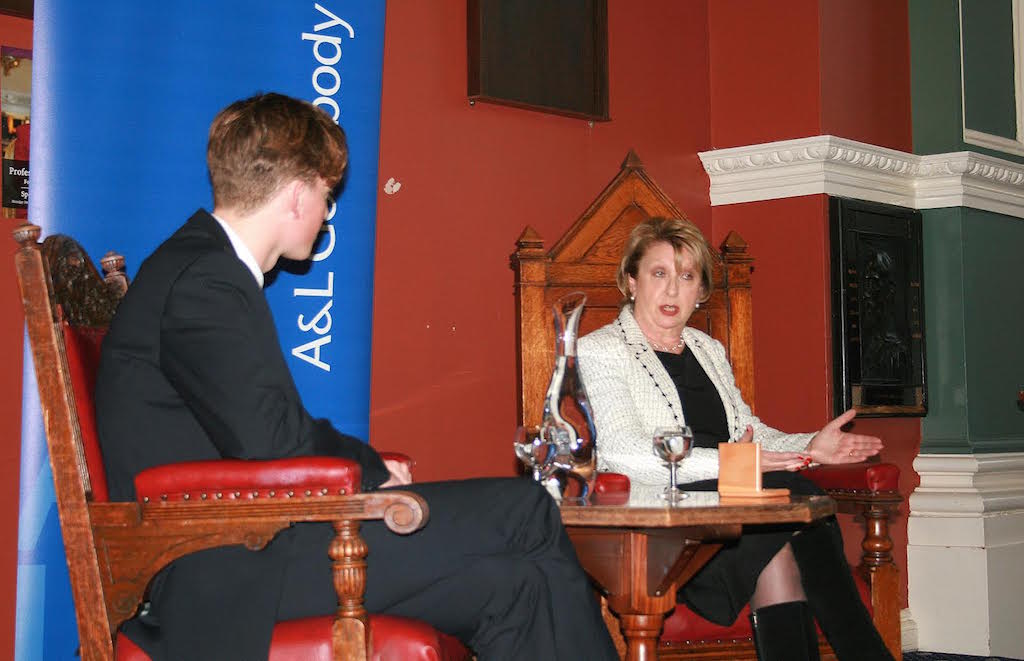
The visit of Mary McAleese, former President of Ireland and Trinity professor, to Law Soc today saw her address a number of key social issues, from the passing of the marriage equality referendum in May, to the ongoing “repeal the eighth” campaign.
As Kean Kavanagh, auditor of Law Soc, so rightly said in his introduction to Mary McAleese, for most students, she is the archetypal president. Too young for Mary Robinson, and too old for Michael D Higgins, it is McAleese who comes to mind when one thinks of the occupier of Áras an Uachtaráin.
During the talk, McAleese rubbished the “urban myth” that former heads of state should refuse to intervene in contentious national issues. Indeed, no one could argue that McAleese prefers to stand at the margins of Irish life. Her response to the New York Times’s coverage of the Berkeley balcony collapse, where she wrote an open letter heavily critical of the paper’s reporting, attracted international attention. Reflecting on that response, she expressed her horror at the insensitivity of the coverage that “insulted not just the dying and the dead, but the whole of Ireland”.
At the talk today, McAleese showed little reticence in tackling challenging issues, including the current campaign to repeal the eighth amendment of the constitution, the subject of a campaign by Trinity College Dublin Students’ Union, that severely limits access to abortion for Irish women.
Responding to a question from the audience, McAleese expressed her hope that in the future there can be a “sane and decent” debate on the issue. Pointing to a decision made in the Northern Irish High Court today, on the provision of abortion for when a foetus has a fatal abnormality, McAleese emphasised the importance of a measured discussion, calling on people “not to hit it with blanket statements but listen carefully to nuances”.
McAleese outlined her difficulty in supporting an outright freedom of choice for mothers: “if every mother has a right, up until the moment of birth, to end the life of the child in her womb, I can’t sign up to that”.
Indeed, such a topic was symptomatic of the talk as a whole. As Kavanagh questioned McAleese on her achievements on her time in office, the discussion neatly encapsulated the dramatic social change that has struck Ireland in the last two decades.
Indeed, for McAleese her time in office was marked by “people locked into fixed positions deciding to unlock themselves”, whether through the negotiations that led to the Good Friday Agreement and the peace process, or the referendum on marriage equality.
McAleese spoke powerfully on the significance of the referendum, calling May 23rd the day a “tsunami of grace flowed through the bodypolitik”.
She recalled a radio interview she gave in 1979, where she predicted that one day the Irish people would have to address the issue of gay marriage. For her, the referendum illustrated the “latent goodness of Irish people, their decency, and ability to identify with the marginalised”.
Yet McAleese also made clear the personal element of her support for the referendum. As a mother to a gay son, McAleese described the feelings of guilt had she not spoke out: “the act of cowardice it would have been to be silent”.
For her, the purpose of the presidency is to “nudge change in a benign, useful and healthy direction”. This was clear in her role in advocating for Good Friday Agreement, which she called a “road map for solving problems”.
Listening to McAleese, it’s refreshing to hear a politician, whether retired or not, express such clear and honest opinions to a roomful of students. During the talk, she commented: “the technology for changing people’s minds – I wish there was an app for that”. Something tells me that such technology won’t be necessary just yet. Considering the impact that McAleese has had on Irish life before and during her two terms in office, her influence is probably enough to compete with any app.
Correction: December 1, 2015
An earlier version of this article, and the subheading accompanying the article, incorrectly asserted that McAleese expressed her support for the repeal of the eighth amendment. While she said she was in favour of “all such treatment that is necessary to ensure [a woman’s] life and her own health, including that which may result in the death of an unviable foetus”, she did not express support for the repeal of the eighth amendment.






